The Lunar New Year, sometimes called Tết Nguyên Đán ceremony, is the most significant occasion observed in Vietnam. Families get together on this occasion to honor their ancestors and pray for good fortune, money, and health in the next year.
Though the public holiday is only recognized for one week, the Tết celebrations last for much longer. If you decide to go trip around Vietnam's Lunar New Year, here is what you could expect.
Overview of Vietnamese Holiday Tet
Tết Nguyên Đán, or just Tet, is the Lunar New Year for Vietnam. Often likened to Western New Year, Tet Holiday honors ancestors, marks the advent of spring based on the lunar calendar, and offers a time for family get-togethers expressing expectations for a fruitful year ahead.
Tết is a deeply ingrained custom for the Vietnamese that symbolizes a fresh beginning rather than only a New Year celebration. Families mark the elimination of previous tragedies by cleaning their houses and clearing their minds to start again.
Tet also captures the Vietnamese virtue of filial piety since it's a time to honor ancestors and get together with loved ones.
Lunar New Year in Vietnamese falls according to the lunar calendar, hence its date changes annually. Usually representing the beginning of a new lunar year, it falls in late January or early February. Beginning on January 29, the Tết holiday will span multiple days in 2025.
Preparations for Vietnamese Lunar New Year festival
Before Tet Holiday in Vietnam, Vietnamese people meticulously clean their houses to rid any residual ill fortune. Many others also remodel and paint their homes to provide a fresh, brilliant space for bidding the New Year welcome.
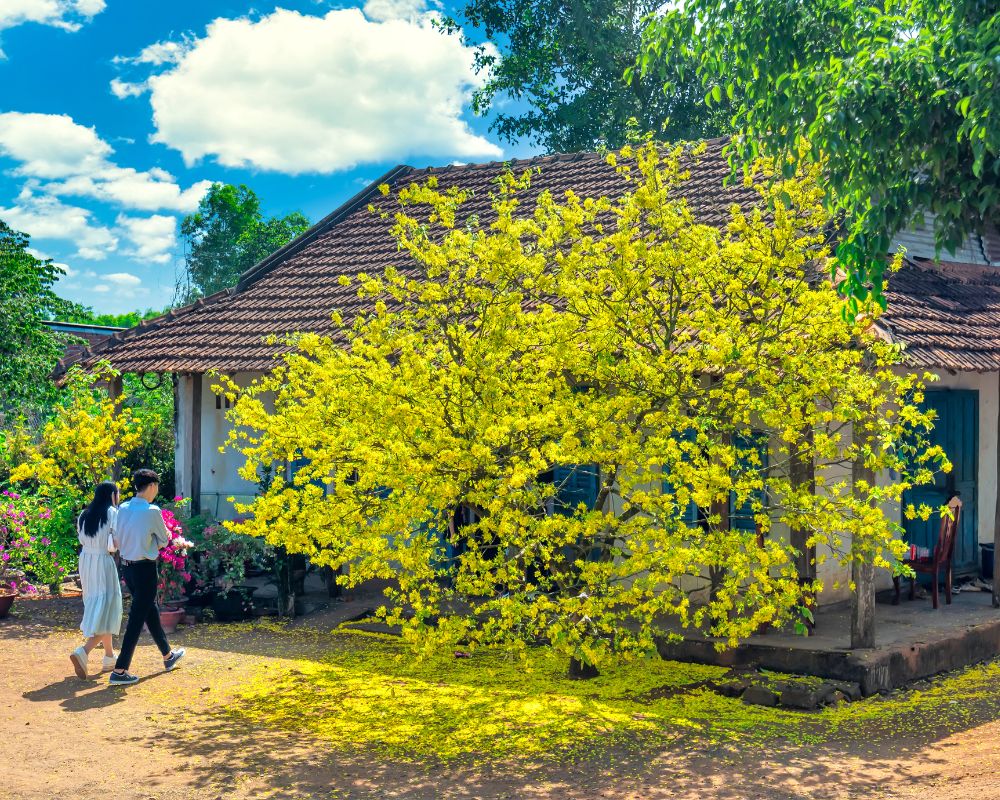
The apricot tree blooms in front of old house on a spring morning
For the Vietnamese, Tet is a deeply ingrained custom symbolizing a fresh start rather than only a New Year celebration. Families represent the elimination of past disasters as they tidy their houses and clear their minds to start over.
Tet celebration also symbolizes Vietnamese notion of filial piety since it's a time to honor ancestors and get together with loved ones.
Tet follows the lunar calendar, hence its date changes every year. Usually representing the beginning of a new lunar year, it falls late January or early February. The Tet holiday will start on January 29, 2025, and last several days.
Read more: Top 10 Traditional Festivals In Vietnam That You Must Experience 2025
Preparations for Vietnamese Lunar New Year festival
Cleaning and decorating their house
Before Tet Holiday in Vietnam, Vietnamese people meticulously clean their houses to rid of any residual ill fortune. Many people also remodel and paint their homes to provide a fresh, brilliant space for bidding on the new year welcome.
Purchasing Tet presents and decorations
Popular Tet decorations are red calligraphy banners, kumquat trees, peach blossoms in the north and apricot blossoms in the south. These objects stand for happiness, health, and wealth.
Many Vietnamese pastimes include clothes shopping, haircut styling, cooking traditional cuisine, floral buying, and even motorbike washing. Every house and business will show signs of "Chúc Mừng Năm Mới," and kumquat trees or peach blossoms will be arranged specially.
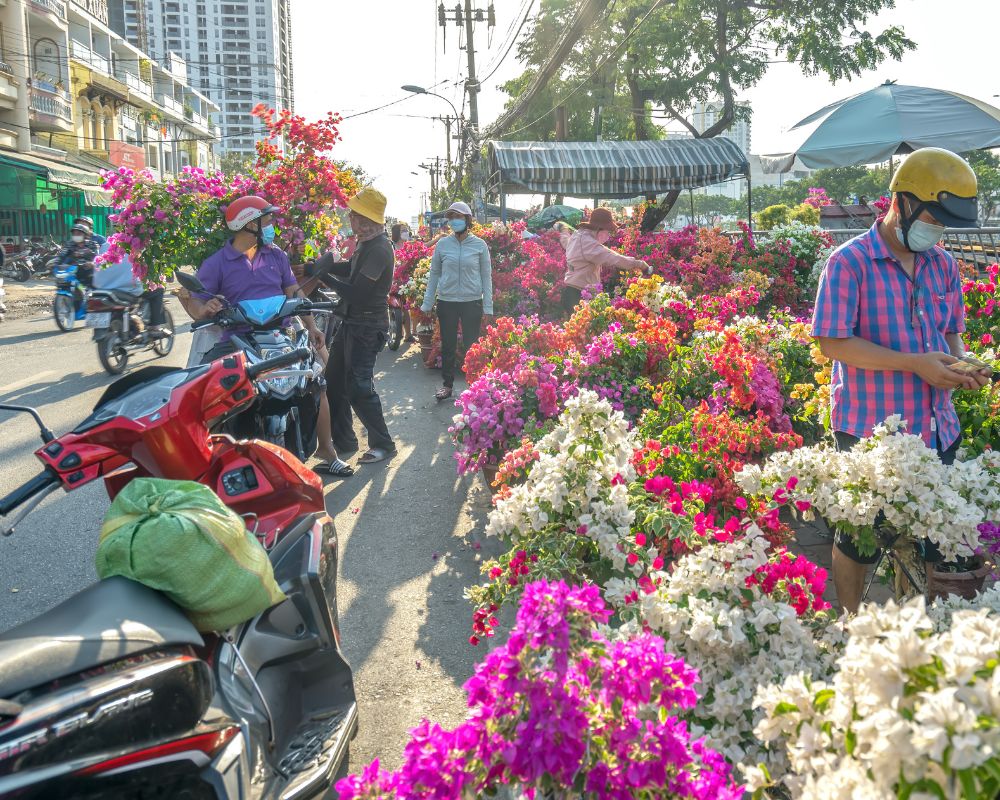
Locals buy flowers for decoration purpose the house
Kitchen God Day (Ong Cong - Ong Tao)
On December 23 of every year, Vietnamese people honor Ong Cong - Ong Tao. Running the house and in command of the entire family are they. These gods are said to return to heaven today to provide the Emperor their annual family member report.
Every house cleans the altar on Kitchen God Day, presents fresh flowers, fruits, sweets, paper caps and garments, burns incense, and lets a carp go. Becuase three gods will use these presents on their return to paradise.
Ritual offerings to the ancestors
Traditional presents had to be presented to God and the dead on Lunar December 30, New Year's Eve. Every family prepares a dish of classic cuisine including chicken, sticky rice, Chung cake, Vietnamese sausage, spring rolls, and more. This is asking your ancestors to come join your family during Tet and pray for a lucky and calm new year.
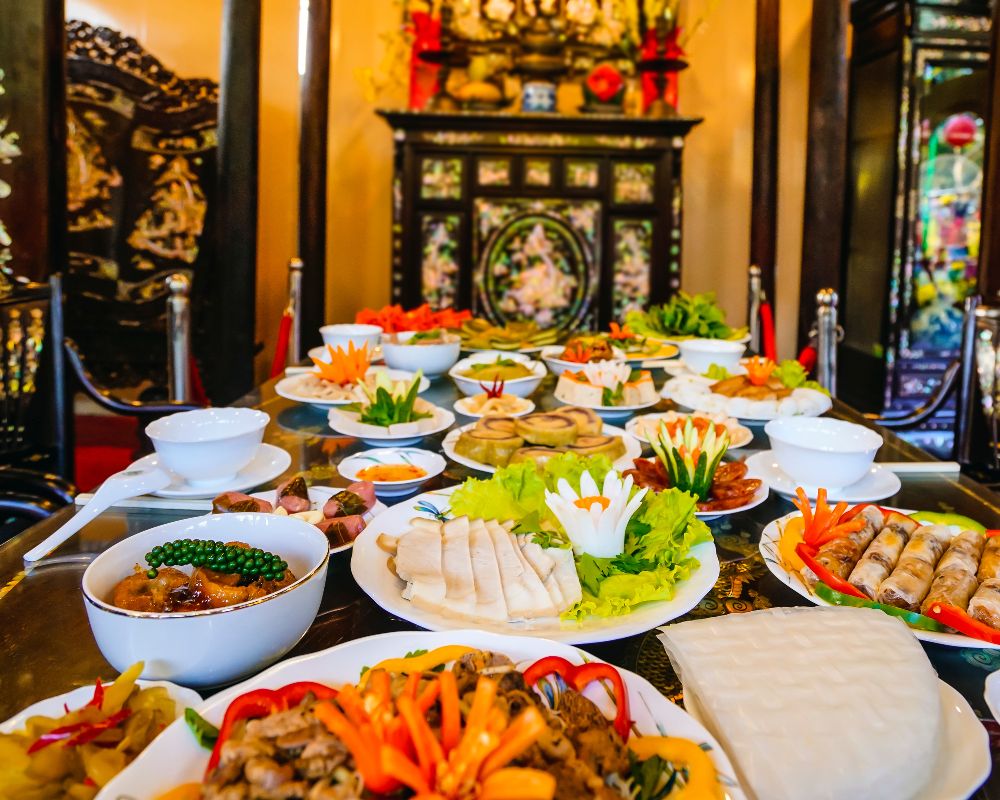
Traditional Tet Festival cuisine of Vietnam
"Xông đất"
"Xông đất" is a ritual observed in Vietnam whereby the first individual visiting a house in the new year had to obey rules. Vietnamese custom holds that the first person to enter the house—the "xông đất"—will determine the fate of the host family.
The "xông đất" person should so be prosperous, moral, and physically fit. And selecting the correct person will offer luck and contentment for the whole next year.
"Chúc Tết"
People pay their grandparents visits and wish them well when Tet rolls around. This will luck everyone in the next year. Usually, the younger person will "chúc Tết" the elder one first. The family will also eat together on the first day of the gathering.
Vietnamese folks celebrate Tet over three days normally. They visit their father's side on the first day; their mother's side on the second; their teachers on the third.
Lucky money - Lì Xì
Giving young children and the elderly lucky money, or "Lì xì," is common among those looking for fast growth, excellent behavior, and academic success for the children as well as for a long, healthy life for the elderly. As a wish for a calm and contented new year, people also bestow lucky money to one another.
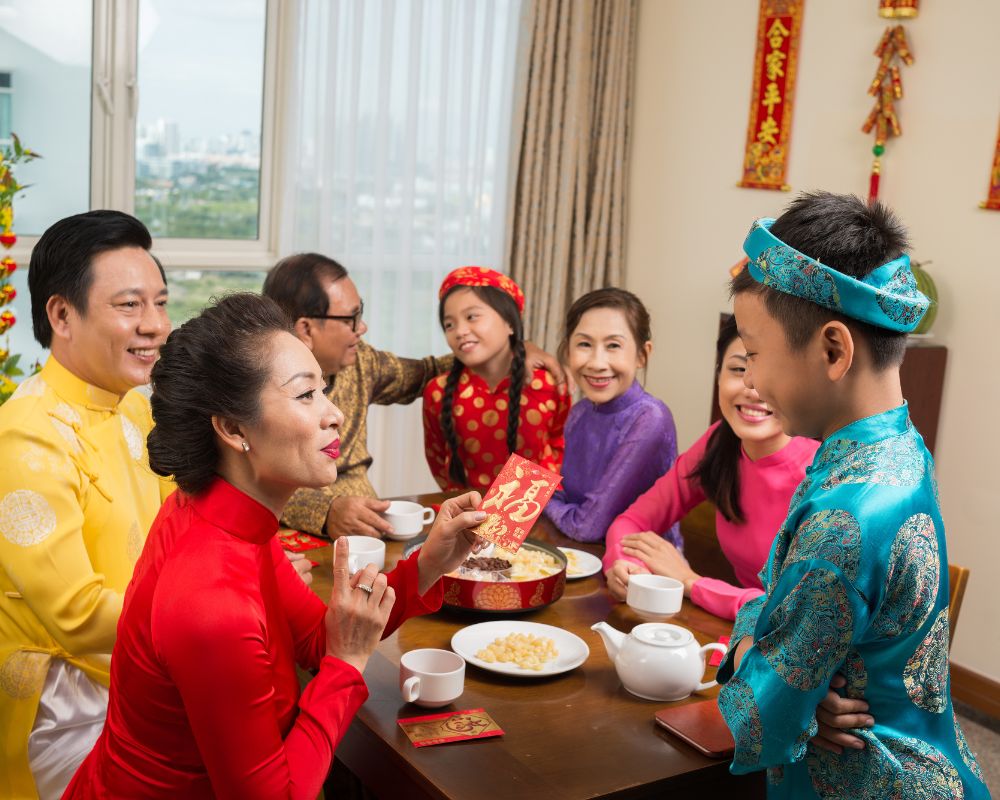
Lucky money
Visit pagoda
People also shed their avarice, jealousy, and set their minds on pleasant things at the beginning of a new year. So people visit pagodas and temples to seek peace, health, and happiness in the new year as well as to clear their souls.
Of course, this may also be a family excursion over the long holiday, an opportunity to spend time with one another and strengthen bonds.
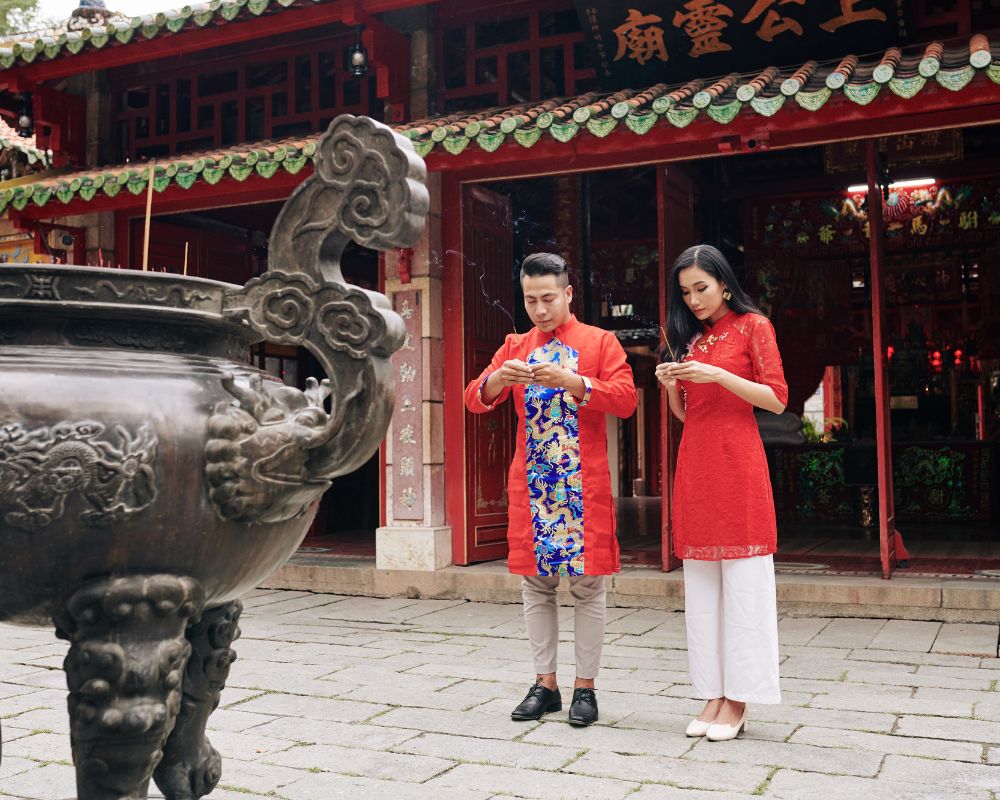
Young Vietnamese couple in traditional costumes praying
Traditional foods during Lunar New Year in Vietnamese
Vietnamese families cook numerous unique traditional Tet dishes during Tet that bring luck and wealth for the next year. And two of the most vital dishes are bánh tét and bánh chưng.
Made with mung beans, pork, and covered in green leaves, bánh chưng (Chung cake) is a square-shaped sticky rice cake. This square form stands in for the Earth.
Besides, popular in southern Vietnam, bánh tét (tet cake) is a cylindrical rice cake that represents the heavens. Both cakes are symbolic and frequently presented to respect ancestors.
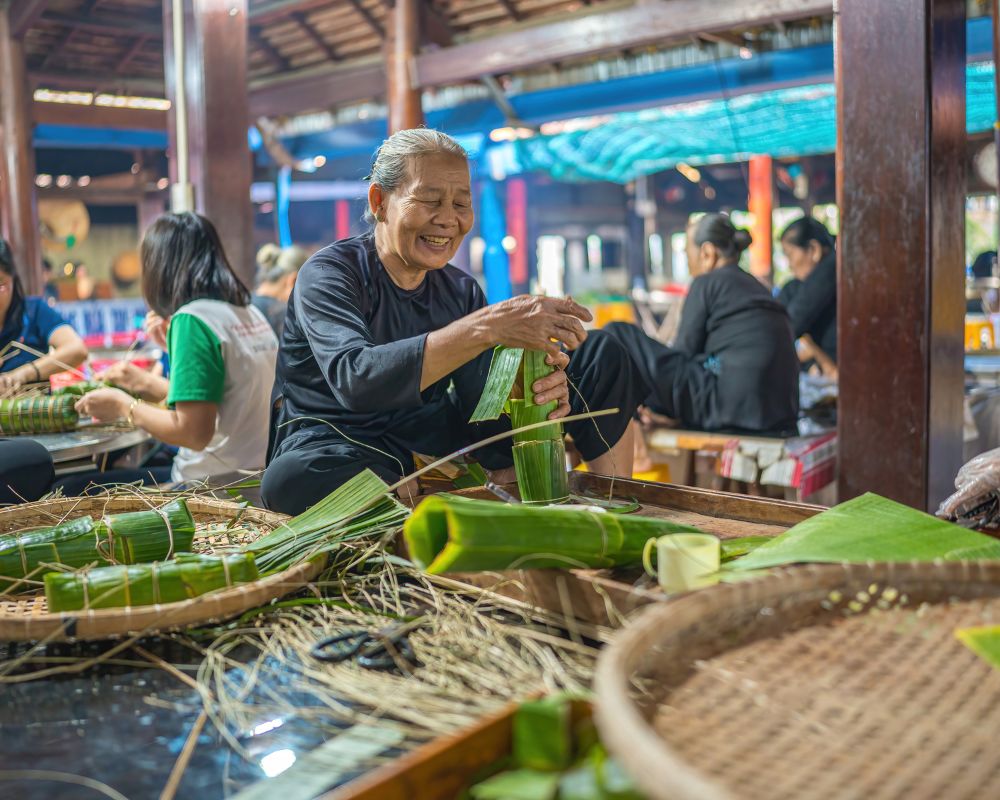
Wrapping Tet Cake
Giving guests and relatives sweets, dried fruits, and watermelon seeds is another important component of Tet Holiday customs. Usually, the treats call for coconut, ginger, and candied fruits.
They stand for year's worth of good fortune and sweetness. Watermelon seeds are also rather common since they represent development and wealth. And these sweets are presented in unique packaging.
Finally, Tet is also a time for savory foods including pickled vegetables, bitter melon soup, braised pork with eggs. Rich and filling, the braised pork stands for much. Pickled vegetables, which stand for refreshment and fresh starts, balance the meal.
Eat bitter melon soup, one hopes it will "take away" the bitterness of the past year and provide space for happiness in the new one.
These traditional Vietnamese dishes for Tet not only taste delicious but also carry the hopes and wishes of Vietnamese families for a peaceful, joyful, and prosperous year ahead.
Tips for travellers
For the Tết holiday, people will travel back to their hometowns, generating strong demand for bus, rail and plane tickets as well as hotel rooms. If you have to travel during this period, attempt to arrange lodging and transportation long ahead.
If you're looking for transportation options, consider Vietnam Budget Car Rental as a convenient choice for getting around. Our car rental service offers a range of vehicles suited to individual and family travel, helping you enjoy a flexible journey during Tết while avoiding the crowded public transport.
With our car rental, you can visit your destinations at your own pace and experience the beauty of Tết in various regions without the rush of traditional holiday transport.

Our Ford Transit 2024
Read more: Travel To Vietnam During Tet Holiday
Businesses and restaurants also typically close at least the first few days of Tết since many staff members go back home to see their families. So limited food and retail options. You also will feel quiet during this time.
The first few days of Tet holiday in Vietnam offer a rare chance to see big cities free from traffic and pollution. You can explore on foot, scooter, or bicycle and enjoy the serenity.
Especially a big honor may be yours getting asked inside a family's house for Tết. Since the first guests of the year are particularly chosen to bless every household, it is imperative not to visit any Vietnamese house without an invitation during Tết.
Especially appreciated both during and around Tết are nice wishes. Smile and say "Chúc Mừng Năm Mới," (Happy New Year), to everyone you come across on the first days of the new year.
